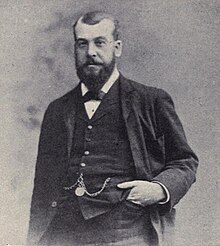Charles Cruft (showman)
| Charles Cruft | |
|---|---|

A photograph of Charles Cruft, published in 1902
|
|
| Born | 28 June 1852 |
| Died | 10 September 1938 (aged 86) Highbury, London, England |
| Cause of death | Myocardial infarction |
| Resting place |
Highgate Cemetery 51°34′04″N 0°08′56″W / 51.5679°N 0.1488°WCoordinates: 51°34′04″N 0°08′56″W / 51.5679°N 0.1488°W |
| Alma mater |
|
| Occupation | Show promoter and businessman |
| Known for | Crufts Dog Show |
| Net worth | £30476 9s 3d |
| Spouse(s) |
|
| Children | Charles Francis, Louise, Cecil Arthur and Clara Helen Grace (from first marriage) |
| Parent(s) | Charles Cruft (father) |
Charles Alfred Cruft (28 June 1852 – 10 September 1938) was a British showman who founded the Crufts dog show. Charles first became involved with dogs when he began to work at Spratt's, a manufacturer of dog biscuits. He rose to the position of general manager, and whilst working for Spratt's in France he was invited to run his first dog show at the 1878 Exposition Universelle. After running dog shows in London for four years, he ran his first Cruft's dog show in 1891, and continued to run a further 45 shows until his death in 1938, as well as running two cat shows in 1894 and 1895. He was involved in a range of dog breed clubs, including that for Schipperkes, Pugs and Borzois. He and his wife upheld a story that they never owned a dog, and instead owned a cat, however Cruft admitted to owning at least one Saint Bernard in his memoirs, published posthumously.
Charles Cruft was born on 28 June 1852, one of four children. In his youth, Charles attended Ardingly College in Sussex, and Birkbeck College in London. Cruft first followed in his father's footsteps by becoming a manufacturing jeweller but he ultimately decided that the career was not for him and left the business in 1865.
He went on to apply for the post of office boy in the Holborn shop of James Spratt, the manufacturer of Spratt's dog biscuits. He was recruited by Spratt, who would later go on to say that Cruft had lent forward in the interview at one point whilst talking about the business and said "You know, I think this kind of business ought to do very well, I do honestly." Cruft overhauled the bookkeeping in the shop, changing it from a system using crosses to distinguish between wholesale and retail customers to a far more detailed system. The Maltese cross that was previously used in the bookkeeping was later instead stamped onto the biscuits as a type of trademark to distinguish Spratt's biscuits from other dog biscuits.
Several months after joining, Crufts convinced Spratt to hire a new boy to work in the shop to free himself up to solicit orders for the dog biscuits from gamekeepers, promoters of dog shows and the like. He saw a connection between improved feeding and purebred dogs, and so supported the foundation of canine societies. As part of this new role, he was expected to have attended the "Grand National Exhibitions of Sporting and other Dogs" at The Crystal Palace, London, annually between 1870 and 1872. These early shows were unsuccessful financially and were not continued. Whilst at Spratt's, Cruft gradually rose to the role of general manager, after being head of their Show Department for several years. At the age of 26, some twelve years after leaving the jewellery business, Cruft was made office manager. The Spratt's dog biscuits became the forerunner of the modern dry dog food, and under Cruft's work the company went from a single small shop to the British leader in these types of products.
...
Wikipedia
